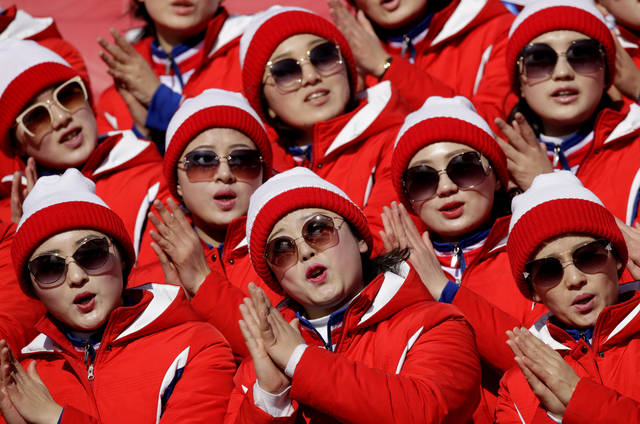As Olympics wrap up, still no coverage in North Korea

ASSOCIATED PRESS
North Korean cheerleaders performed during the first run of the women’s slalom at the Winter Olympics on Feb. 16.
PYEONGCHANG, South Korea >> While hundreds of millions of the world’s people get ready to watch the closing ceremony of the Pyeongchang Winter Olympics on Sunday, North Koreans are still waiting to see the first event.
The lack of news at home is a stark contrast with how North Korea’s made-for-the-cameras delegation at the games, replete with hundreds of cheerleaders and even one of the country’s most popular singers, has been a big hit with the South Korean media and some of the hottest Internet clickbait of the entire games.
North Korea’s state-run media has never been especially devoted to covering international news events. Their job is more about hailing Kim Jong Un and whatever the ruling regime’s latest propaganda message might be. On that front they have stayed true to form: The only reports from Pyeongchang as of Saturday afternoon were about the visit of Kim’s younger sister and North Korea’s nominal head of state to attend the opening ceremony.
Even taking into account the North’s reluctance to portray South Korea in a positive light, the blackout is a bit mysterious.
Kim Jong Un himself used his annual televised New Year’s address to wish for the games’ success and announce the North’s plan to participate, prompting officials from both Koreas to make a major effort so that Pyongyang could send more than 500 people, including 22 athletes and 21 reporters (none of whose work has been seen).
The North’s gambit largely worked. Its all-female cheering squad and the singing performances piqued the interest of Olympic fans worldwide, though the athletes, mostly young and inexperienced in international events, won no medals and struggled just to keep up.
Don't miss out on what's happening!
Stay in touch with breaking news, as it happens, conveniently in your email inbox. It's FREE!
“North Korean athletes are competing on the world stage, even if they’re not winning,” said Martyn Williams, a North Korea media watcher and creator of the North Korea Tech website. “So the lack of a mention is mystifying.”
Williams said North Korea broadcast coverage of every Olympics going back to the 2004 Athens Summer Games, missing only the Vancouver Winter Olympics in 2010. He said there may have been more, but that’s as far as he is able to confirm.
Previous Olympics generally got occasional reports, with a focus on the achievements of North Korean athletes, one or two days after the actual competition.
This time around, Williams said he has yet to see a “single second” of Olympics coverage on KCTV, the primary broadcaster.
“Last weekend’s ‘International Sports News’ program featured a cycle race from Dubai, European basketball and European football, but no Olympics,” he noted. “In the evening news each evening, the Olympics have not been mentioned except in the context of the North Korean party delegation attending events. Even then, no video has been broadcast. It’s been covered with still images.”
The absence of video might suggest a rights’ issue — which is a legalistic can of worms.
Two people involved with Olympic broadcast rights for the SBS network, initially the official rights holder for the whole peninsula, said their network returned rights for the North to broadcast the games directly to the International Olympic Committee, but were not sure if Pyongyang had requested permission to use them. Previously, the North would have gone through the non-profit Asia-Pacific Broadcasting Union, but concerns over possible sanctions violations might have made the IOC route more feasible.
Even so, broadcast rights restrict only video and reporting done within IOC-designated venues. Reports from “outside the rings” are fair game.
The country’s newspapers and its state-run news agency, KCNA, have also steered clear of the games, though written stories and still photographs are not subject to the same restrictions as television. KCNA’s top stories Saturday afternoon were — typically — a report about the anniversary of Kim Jong Il’s birth being observed last month in Russia, Mongolia and Guinea, and another about Kim Jong Un’s work being posted on an African website.
With no one commenting in public, it’s hard to say anything definitively what Pyongyang is thinking.
But North Korean authorities maintain tight control about what does and does not go on the airwaves. It’s possible they’re waiting to see how the high-level interaction between North and South goes before they decide how — or if — to show anything from the Olympics themselves.
The closing ceremony will be attended by a senior government official who was formerly in charge of the North’s military intelligence bureau. He’s set to arrive just before the ceremony for a three-day stay.
Pyeongchang organizers claim roughly 300 million people — including 10 million in South Korea alone — watched some part of the games’ Feb. 9 opening ceremony, which was broadcast live around the world.
North Korea has the capability to do live broadcasts, but uses it very sparingly.
KCTV broadcast the 2011 funeral of Kim Jong Un’s father in real time. For the past five years or so it has regularly gone live for military parades on Pyongyang’s Kim Il Sung Square and fireworks displays on New Year’s eve. It is possible the broadcasts employ time delays of a few seconds or more.
The only time it’s believed to have broadcast an international sports event live on its main channel was the North Korea-Portugal match in the 2010 World Cup. And that might be why they haven’t done any since.
Portugal won, 7-0.



